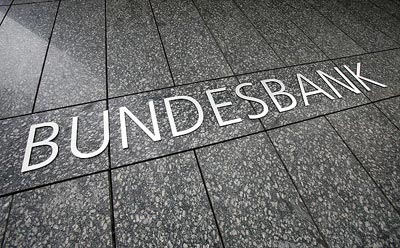Bundesbank posts distributable profit of €0.4 billion in 2016

The Bundesbank posted a profit of €1.0 billion for the 2016 financial year, compared with €3.2 billion in 2015. Owing to an allocation to the reserves, the remaining distributable profit amounted to €0.4 billion and was transferred in full today to the Federal Government pursuant to section 27 number 2 of the Bundesbank Act (Bundesbankgesetz). The difference of €0.6 billion was the result of a change in the regulations for discounting pension provisions This was subject to a restriction on distribution and was therefore transferred to the reserves.
“The profit for the year is lower than in 2015 because the Bundesbank increased its risk provisioning,”
Bundesbank President Jens Weidmann explained at the Bank’s annual press conference on Thursday. The Bundesbank accounted for risk by raising its provisions for general risks by €1.8 billion to €15.4 billion. Dr Weidmann mainly attributed this increase to the interest rate risk arising from the growing stocks of assets held under the various monetary policy purchase programmes, which have been taken into account for the first time in the 2016 financial year.
This interest rate risk is the result of a growing balance sheet mismatch between long-term assets and short-term liabilities. For many years to come, the Bundesbank stands to earn only a very low rate of interest on the long-term securities acquired under the purchase programmes and on longer-term refinancing operations, while it might have to pay a higher rate on credit institutions’ deposits in the future.
Continued rise in interest income
The Bundesbank’s main source of profit for the 2016 financial year was interest income, which amounted to €3.7 billion (€3.3 billion in 2015). Interest income mainly climbed on the back of the negative interest rate on deposits, which had risen sharply. Interest expenditure, on the other hand, fell by €0.6 billion to €0.4 billion. Together, these two effects led to a significant rise in net interest income from €2.3 billion to €3.3 billion.
Total assets well above €1,000 billion
Monetary and foreign exchange policy operations further increased the Bundesbank’s total assets, which climbed by a substantial €400 billion to €1,400 billion. “This means that total assets have now well and truly passed the €1,000 billion mark,”
commented Carl-Ludwig Thiele, the Executive Board member responsible for accounting and controlling. “The Bundesbank’s total assets have more than tripled since 2006,”
he added. He explained that much of the balance sheet expansion on the assets side had been driven by the €185.4 billion increase in holdings of securities for monetary policy purposes to €357.7 billion. The purchase of German government bonds under the PSPP alone had accounted for a boost of €165.4 billion. Mr Thiele also pointed out that inflows of liquidity from other European countries had raised the Bank’s TARGET2 claim on the European Central Bank (ECB) by €170.1 billion to €754.3 billion. Turning to the liabilities side, Mr Thiele reported that the liquidity created by the purchase programmes and flowing in from abroad had contributed to the expansion of the Bundesbank’s balance sheet, with credit institutions’ deposits at the Bank rising by €202.6 billion to €411.3 billion and the euro balances of resident and non-resident depositors going up by €123.8 billion to €222.8 billion.
Items on the Bundesbank’s balance sheet that are subject to market price movements, such as gold and foreign currency holdings, are valued at market prices. The resulting valuation gains are not recognised in the profit and loss account but are instead reported on the liabilities side of the balance sheet under “Revaluation accounts”. This item rose on the year from €105.7 billion to €119.7 billion, mainly on account of the higher market price for gold.
German economy in good shape – monetary policy must not be overstretched
A look at the German economy reveals that it remains in good shape, said Bundesbank President Dr Weidmann. “The economy looks set to remain on an upward trajectory this year and the next,”
he stated. “However, this positive outlook should not blind us to the fact that the longer-run outlook for growth in Germany is sub-par,”
he cautioned, particularly in the light of demographic concerns.
According to Dr Weidmann, the euro area, too, is continuing to experience a pick-up in economic activity, although he pointed out that the recent sharp rise in inflation was mainly attributable to higher oil prices. Excluding developments in the price of energy and other volatile components of the consumer price index, the Bundesbank President noted that domestic price pressures are still comparatively low at present, although they are expected to slowly edge upwards. In his view, the euro area is far removed from any risk of deflation – that is to say, a dangerous downward spiral of falling wages and prices. Dr Weidmann stressed that it is possible for there to be differences of opinion regarding the appropriate expansionary scope of monetary policy, highlighting the well-known fact that he is critical of government bond purchases, in particular. Above all, he warned that a central bank should not be stretched beyond breaking point, saying that only politicians can lead the economy back to a path of sustained, higher growth.
Source: Bundesbank


























